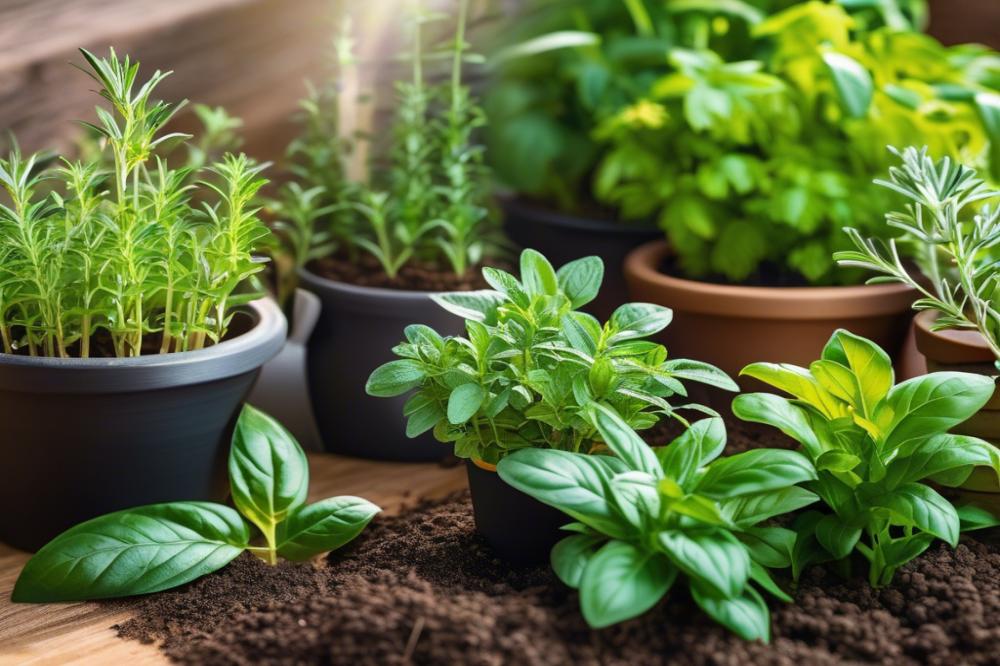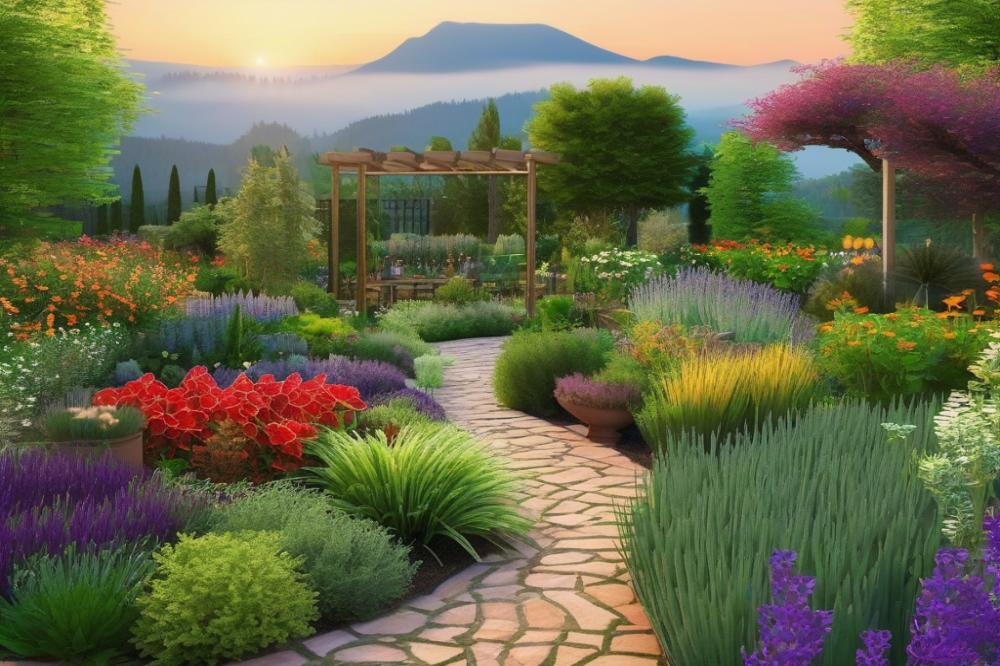The Best Soil Mixes for Thriving herb gardens
Soil plays a vital role in the success of herb gardening. Healthy plants start with nutrient-rich soil that supports their growth. Good soil can lead to bountiful harvests and vibrant flavors. Without a solid foundation, even the best care can fall short. Choosing the right mix is crucial for thriving herbs.
Key components make up effective herb garden soil. First, organic soil matters greatly. It enhances the overall health of plants. Incorporating compost into your mix adds essential nutrients. Compost improves both fertility and structure. Additionally, it boosts microbial activity, which is beneficial for plant roots.
Another important aspect is drainage. Herbs require moisture but also need good drainage to thrive. Too much water can lead to root rot. Perlite and vermiculite can greatly improve drainage in your potting mix for herbs. These materials help aerate the soil and prevent compaction.
Moisture retention is equally essential. A balance in water availability keeps your herbs happy. Combining organic matter with materials like perlite results in better moisture retention. This balance creates a welcoming environment for growth. Adjusting the pH balance of the soil is another consideration. Most herbs prefer slightly acidic to neutral conditions. Testing your soil can guide you in making adjustments.
Whether you plant herbs in raised beds or containers, the right mix will help produce healthy plants. Taking the time to craft the perfect soil mix is worth the effort. In the long run, it leads to a more fruitful and enjoyable gardening experience.
Understanding herb garden soil


Herb garden soil is a blend specifically designed to support the growth of various herbs. This mixture includes different elements that promote healthy root development. Drainage is a vital characteristic; herbs thrive best when their roots do not sit in water. Too much moisture can lead to root rot, which harms plant health.
organic soil plays a crucial role in herb cultivation. Rich in nutrients, it fosters robust plant growth. Compost, made from decomposed organic materials, enriches the soil, ultimately benefiting the herbs. Adding perlite and vermiculite can improve drainage and moisture retention. These components work together, creating a balanced environment for the herbs.
Ideal pH Balance for Herbs
The pH balance of soil significantly influences herb health. Most herbs prefer a pH level between 6.0 and 7.0. This range allows plants to absorb essential nutrients effectively. Achieving the right balance might involve testing the soil and adjusting it with amendments if necessary. Raised bed gardening makes controlling pH levels easier. If you are cultivating herbs in containers, use potting soil tailored for herbs to maintain an optimal balance.
Choosing the correct soil mix enhances the growth of your herb garden. Combining organic components, like compost, with materials for drainage creates a thriving habitat. Remember, a successful garden depends on giving herbs the best possible start.
Essential Components for Soil Mixes


Compost plays a vital role in herb gardens. It enriches the soil with organic matter, promoting healthy growth. Nutrient-rich compost improves pH balance, which is important for herb plants. By breaking down over time, it releases essential nutrients, helping herbs thrive.
Drainage is crucial for preventing waterlogged roots. This is where perlite comes into play. Perlite is a lightweight volcanic glass that creates air spaces in the soil. It helps excess water move away from plant roots, minimizing the risk of rot. Using perlite in raised beds or containers can greatly enhance plant health.
Vermiculite is another key addition. This mineral has the ability to hold moisture effectively. It helps retain water without suffocating roots, promoting balanced moisture levels. A mix that includes vermiculite can be especially beneficial in dry climates or during hot weather. Its moisture retention properties create an ideal environment for herbs.
Having a nutrient-rich mix is fundamental to successful gardening. Herbs may struggle if the soil lacks essential nutrients. A blend that includes compost, perlite, and vermiculite will provide a strong foundation. Mixing these components can lead to productive and vibrant herb plants. The right soil mix serves to support robust growth and flavorful leaves.
Creating the Perfect Soil Mix for Raised Beds


Recommended Ratios of Ingredients
To create a thriving environment in your raised bed, consider blending several key components. A solid mix includes 40% organic soil, 30% compost, and 20% perlite or vermiculite. These ratios work well together to support your herb garden. Organic soil provides essential nutrients. Compost enriches the mix while improving moisture retention. Meanwhile, perlite or vermiculite increases aeration and drainage.
Tips for Mixing Soil for Raised Beds
When crafting your soil blend, work in a large container or directly in the raised bed. Start by measuring each ingredient according to the recommended ratios. It’s important to combine everything thoroughly. Use a shovel or your hands to mix, breaking up clumps for an even consistency. Remember to check the pH balance. Herbs typically prefer a pH between 6.0 and 7.0. Testing kits are readily available at garden centers.
Another helpful tip involves adding a layer of mulch on top of the soil once planting is complete. This layer helps retain moisture and suppress weeds. Regularly check your raised bed for signs of compaction. Turn the soil as needed to maintain its structure.
Benefits of Raised Beds for Herb Gardening
Raised beds offer several advantages for herb gardening. Better drainage is often the biggest benefit. Water drains away from the roots, reducing the risk of rot. Soil in a raised bed warms up more quickly in spring, leading to earlier planting times. Furthermore, these beds allow for easier access while gardening. You won’t need to bend as much, which can reduce strain on your back.
Herbs planted in raised beds typically experience improved air circulation. Good airflow helps prevent disease and encourages healthy growth. Additionally, these structures can be more pest-resistant compared to traditional garden plots. By elevating the plants, you can create a unique environment for flourishing herbs. Remember, container gardening is also a popular alternative if space is limited. The key is providing the right soil mix and conditions for success.
Soil Mix for Container Gardening


Unique Considerations for Container Soil
Container gardening presents distinct challenges, unlike traditional in-ground planting. Limited space in pots affects how herbs access nutrients and moisture. It’s vital to create a supportive environment since roots are confined. Proper drainage is crucial. Without it, too much water can lead to root rot. Thus, you must select the right materials to promote healthy growth. Additionally, pots made from various materials can impact soil temperature and moisture levels.
Suggested Soil Components for Container Gardening
Choosing the right components for your mix will directly influence the performance of your herb garden. Start with organic soil as a base, which provides essential nutrients. Mixing in compost enriches the soil further, enhancing its texture and nutrient profile. For aeration, perlite can be added. This lightweight material helps create air spaces within the mix. Alternatively, vermiculite improves moisture retention, making it helpful during dry spells. Integrating these elements creates a nutrient-rich blend that supports healthy plant development.
Monitoring and Maintaining Soil Health in Containers
Regular monitoring is essential to keep container soil healthy. Observing the moisture level in pots helps you identify when to water. Too much moisture can harm roots, while too little can stress plants. Testing the soil’s pH balance is beneficial too. An ideal range for most herbs is between 6.0 and 7.0. This balance fosters nutrient absorption. Replenishing nutrients is another important task. Every few months, consider adding more compost or a slow-release fertilizer to sustain the herb garden. Lastly, when plants begin to outgrow their pots, replanting them into larger containers will promote continued growth.
Common Mistakes to Avoid
Overlooking drainage and moisture balance can spell disaster for your herb garden. Waterlogged soil hampers healthy root growth and may lead to mold. Perlite and vermiculite can dramatically improve drainage and moisture retention. Mixing these with organic soil creates an environment where herbs thrive.
Ignoring pH levels in soil is another common blunder. Different herbs prefer varying pH balances. For instance, basil thrives in neutral pH while mint favors slightly acidic surroundings. Regularly testing your soil’s pH helps maintain the right conditions. Adjustments can be made using lime or sulfur, depending on your results.
Neglecting organic matter in the mix diminishes the nutrient supply your herbs need. Incorporating compost is essential for a robust herb garden. This addition serves as a natural fertilizer, supporting both growth and flavor. Furthermore, an organic soil mix contributes to overall soil health and sustainability. Remember, healthy herbs come from healthy soil.
Final Thoughts on Crafting the Perfect Soil Mix
Recapping the essential components of a successful soil mix is vital. Quality soil is the backbone of a thriving herb garden. Start with a base of organic soil, which provides vital nutrients. Mixing in perlite or vermiculite is beneficial for improving drainage and aeration. A balance of compost adds richness while maintaining moisture. Including sand can also enhance texture, offering the right blend for good growth.
Experimentation plays a key role in developing the best mix for your herbs. Don’t hesitate to try different combinations and ratios. Each type of herb may respond differently to varying soil types. Consider the specific needs of your plants. Some herbs thrive in more moisture-retentive soil, while others prefer a drier environment.
Gardening is about discovery, and your herb garden can be a canvas for this exploration. With patience and observation, you will find what works best. So, get your hands dirty and enjoy the process! Soon, you’ll be rewarded with a lush selection of herbs to enhance your cooking.



